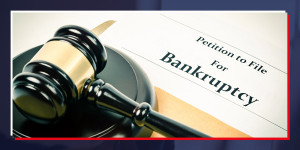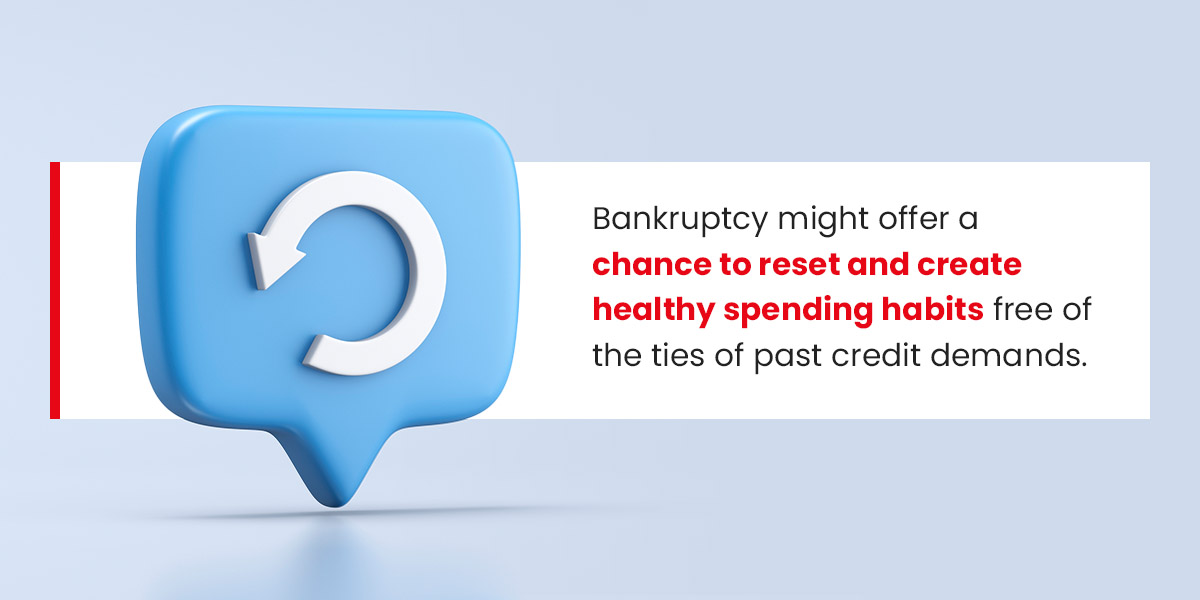
At times, you might feel overwhelmed when looking at your mounting debt repayments and considering bankruptcy — however, many others face the decision of filing for bankruptcy. It is an option that can ease your financial burdens, although there are both pros and cons to this decision.
If you declare bankruptcy, it may mean a clean slate, although it could also mean less eligibility for credit at a later stage, especially when considering how your FICO score is calculated. Consider the following pros and cons of filing for bankruptcy to decide when to declare bankruptcy or find an alternative solution.
What Does It Mean to Declare Bankruptcy?
Asking yourself if you should declare bankruptcy indicates you see the financial reality you experience and want to find a way to amend any shortcomings. There are plenty of reasons why you may consider reaching for the legal lifeline to pull you out of deep debt. First, it is essential to know what happens when you declare bankruptcy.
There are sometimes misconceptions about bankruptcy, which some see as embarrassing or a sign of irresponsible lending. This view is often misguided, as bankruptcy is a legal debt relief strategy that can help you when you have exhausted all other options.
Filing for bankruptcy is a legal means of financial relief that starts with filing a petition with the bankruptcy court. When looking at personal bankruptcy, you must take a means test to determine the type you qualify for. You typically have two options:
- Chapter 7 bankruptcy: If you qualify for a Chapter 7 bankruptcy, certain assets have to be sold to help repay the debts while others are exempt.
- Chapter 13 bankruptcy: A Chapter 13 bankruptcy is a debt adjustment where you keep possession of your assets and sign an agreement to repay your debts over a stipulated period.
Benefits of Declaring Bankruptcy
You take your financial health and obligations seriously, and when you took out your credit, you intended to honor that commitment. Sometimes life gets in the way, and challenges arise, meaning you must consider filing for bankruptcy. Thankfully there are certain benefits to this decision.
An Automatic Stay Protects You
Once you file for bankruptcy, creditors may not pursue you for your debts owed or take action against you. This comforting protection offered by the automatic stay provision in bankruptcy law means they must wait until a repayment plan is finalized.
Possible Prevention of Home Foreclosure and Car Repossession
Whether you file your bankruptcy under Chapter 7 bankruptcy or Chapter 13 bankruptcy, options such as an automatic stay and structuring repayment plans may help you prevent foreclosure and repossession.
Freedom From Some Debts
If your bankruptcy is filed under Chapter 7, many debts get wiped away, and you are exempt from servicing ones such as:
- Medical bills
- Credit card debt
- Personal loans
- Personal liability on car loans
- Phone bills
- Overdue utilities
It Might Improve Your Credit Score
Your credit score might improve in the long run due to the amounts you owe reducing to a manageable and eventually non-existent amount.
Your credit utilization ratio is almost 30% of your FICO credit score. Bankruptcy will mean you reach a point where you use less than your available credit. Paired with other efficient ways to improve your credit score, it will help you return to good standing.
A Fresh Financial Start

Bankruptcy might offer a chance to reset and create healthy spending habits free of the ties of past credit demands. It also allows you to rebuild your credit score and history slowly.
Implications of Declaring Bankruptcy
The critical question of if you should file for bankruptcy can sometimes be answered when weighing up the potential outcomes. When looking at the pros and cons of filing bankruptcy, these are some of the implications of the decision.
You Could Lose Valuable Assets
There are cases where the appointed trustee must sell your beloved home and car to furnish your debts. It depends on certain factors, such as the type of bankruptcy you qualify for, the equity of your assets, your total income, and the likelihood of meeting revised payments.
Co-Signers May Be Responsible for Payments
If you file for bankruptcy and have a co-signer for any particular loan or debt in Chapter 7 bankruptcy, they are still liable, and creditors have the right to insist on payments from them. Thankfully, if you receive a Chapter 13 bankruptcy, the stay extends to and covers co-signers as long as you honor the agreement and make scheduled payments.
It Is Made Public and May Affect Your Career
Bankruptcy goes public, and those with a Public Access to Court Electronic Records (PACER) account can gain access to it. Filing for bankruptcy is inconsequential for most employees — however, if you work as an accountant, bookkeeper, or work in payroll, your employer will see it when they do a credit check for employment, which may reflect unfavorably.
Impact on Your Credit Profile
Filing for bankruptcy will affect your FICO and other credit scores as your payment history makes up 35% of your FICO credit score and plays a role in future credit access. If you have a good credit score, to begin with, you are likely to feel the blow more. Additionally, bankruptcy only falls off your credit report after 7-10 years.
Factors to Consider Before Declaring Bankruptcy
Before you file, you should understand the pros and cons of declaring bankruptcy and the benefits and implications of this critical decision. Knowing when to file bankruptcy is a multifaceted process, and there are several factors to consider when filing for bankruptcy:
- Impact on family: Money is a tool — the value lies in your family, and it is crucial to consider how bankruptcy may affect your family, positively or negatively. It is also essential to maintain communication during the process. It may hamper your future borrowing, and other restrictions may apply.
- Future plans: Filling for bankruptcy will impact you now and in the long term. If you need to give up your house or car, it is wise to think about plans to mitigate these consequences.
- Debt amount: Truly consider how much debt is worth filing for bankruptcy. This amount differs for everyone, though there are some commonalities. Consider the magnitude and type of the debt and whether it is possible to rework it or your finances.
- Explore other options: Consider ways to pay off your debt before choosing bankruptcy. Contact your creditors and ask for a forbearance or loan modification. If you owe the IRS, speak with them, as payment options are available such as an offer in compromise and individual and business payment plans.
In Need of Financial Support? Apply for a Personal Loan
When faced with mounting debt and creditors' mail and phone calls causing you grief, you may consider filing for bankruptcy, though it should only be a last resort. Alternatively, debt consolidation with Atlas Credit is another option available to you.
We value our staff and clients, and pride ourselves on what our customers say about us. We provide upfront information on your payment term due dates, monthly repayment amounts, and the total amount payable, ensuring complete transparency and peace of mind.
You can easily apply for an Atlas Credit loan online, and one of our qualified staff members will contact you to start the process. Or, visit one of our many locations and experience our quality service firsthand.



